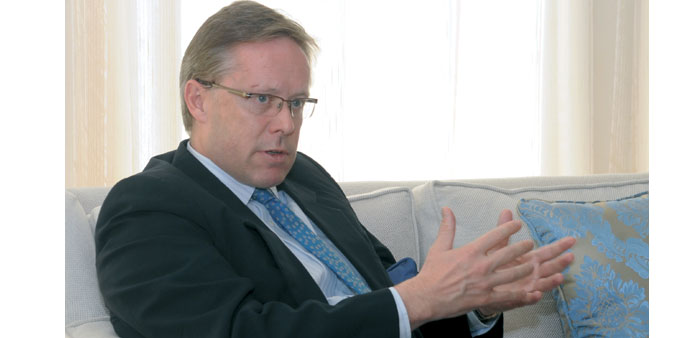By Salman Siddiqui/Staff Reporter
The British government will “strongly support” the Taliban office in Doha as a “very positive development” and hopes it opens “soon”, outgoing British ambassador Michael O’Neill told the media during his farewell press conference yesterday.
Responding to a question on the UK’s role in talks over opening of the Taliban office in Doha, O’Neill said: “We think it would be a very positive development for a Taliban political office to open here. It would be positive because it’s necessary for the Afghan people, just like people in other conflicts, to find a political settlement to the challenges that exist in their country.”
The envoy stressed the need for a process of dialogue that involves the Kabul government, neighbouring countries, international players and the Taliban. “The government of Qatar has said it is willing to host the office. So yes, of course we discuss this with the government in Kabul, in other neighbouring countries, US and the government of Qatar. The dialogue has been happening for sometime, it’s been intense.”
He said while the UK has been involved in the discussions on the Taliban office, it was not the principal player.
“We hope that there will be a positive outcome soon. (The) UK has been involved in these discussions. Afghanistan is very important to us. I spent 18 months there (in Helmand province in the past); we’ve had a big involvement in that country for several years.”
The British envoy, who is expected to leave Qatar to join his country’s foreign office in London by the end of this week, said the two countries (Qatar and the UK) continue to have a very close co-operation on Syria. He said numerous high-level contacts have occurred, including the UK’s foreign minister, national security advisers, chief of defence and head of intelligence agencies to Qatar.
He called for an improvement in the ground situation in favour of the forces opposed to Syria’s Bashar al-Assad. “The situation on the ground is very difficult with the fall of Qusayr (to Assad’s forces). The opposition is facing many challenges and we want to see an improvement in the situation on the ground… We want to see a settlement that reflects the wishes of the Syrian people. We think this would need to involve a different government. (Only a) change in (Assad’s regime in) Damascus would bring a better future to the people.”
O’Neill said in any conflict in history, there has to be a political settlement in the end. “We are now all looking forward to the meeting in Geneva, which will include the opposition, the government in Damascus and all international partners,” he added.
The envoy said no decision had yet been taken on enforcing no-fly zones or what type of lethal arms could be provided to the opposition forces, and only stressed that all options were being looked into.
“There is an opposition group in Syria, which has a political leadership and military dimension. We want to give them support and continue the efforts they’ve already made to become more united and coherent,” he said.
When asked whether he too believed that the so-called “red line” has been crossed, which concerns US allegations that Assad’s regimes were using chemical weapons in the conflict, the British ambassador said: “Our prime minister has spoken about this. We think there is strong evidence, which we have shared with the United Nations about the use of chemical weapons, which we take very seriously.”
On the number of visas being issued from the British embassy in Doha, the envoy informed that in 2013 they have received over 11,658 visa applications, compared to 9,517 during the same period in 2012 – approximately a 23% increase.
In 2012, the British embassy received 34,000 visa applications, up by 38% over the previous year and about double the number in 2010. The ambassador said visas were issued for about 90% of applicants and a number of steps had been taken to make the process easier for Qataris.
Although he is leaving the ambassadorial post only after completing one year instead of the normal two or three years in Qatar, O’Neill said his departure was not out of the blue and in fact he had informed the Qatari authorities well in advance.
“I’m very sorry to be leaving early. I’ve had an amazing year in one of the most remarkable countries in the world… For personal reasons, I need to go back to my family. I’ve been away from my family for three years,” he said.
He said among the main impressions he would take away from Qatar would be the boldness and breadth of the country’s National Vision 2030. Also, he said he was very impressed with the dynamism, energy and candour of the leadership of Qatar, including HH the Emir, HH the Heir Apparent, HH Sheikha Moza and HE the Prime Minister.
About his successor, O’Neill said he was confident that there won’t be a long gap keeping in view the importance the British government attaches to its relationship with Qatar.

Outgoing British ambassador to Qatar Michael O’Neill.
